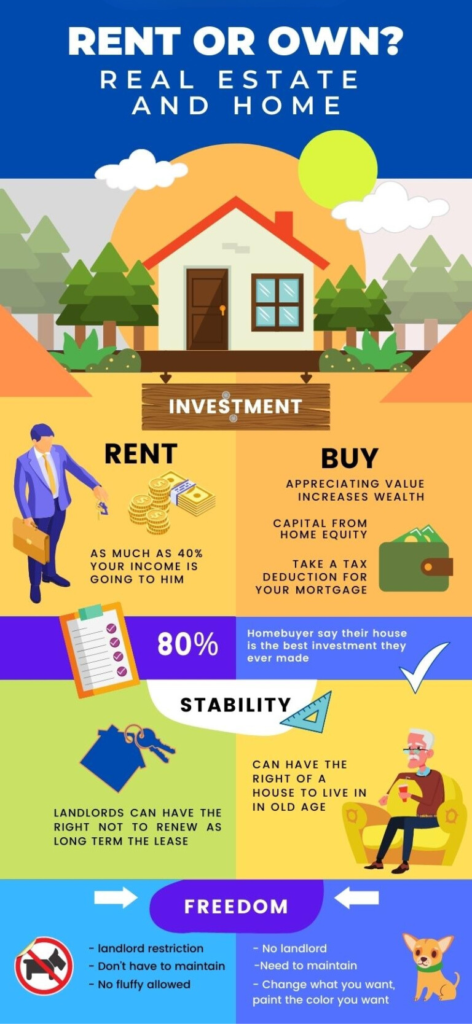
The decision between renting or owning a home is one of the most significant financial choices you’ll make in life. Each option comes with its own set of benefits and challenges, and the right choice depends on various personal and financial factors. At Property Epicenter, a boutique real estate investment and management company based in Gurgaon, we help high-net-worth individuals (HNIs) and investors navigate these decisions with precision. This blog will explore the pros and cons of both renting and owning, helping you make a more informed choice based on your lifestyle, financial status, and long-term goals.
1. Financial Situation: The Foundation of Your Decision
Your financial position is crucial in determining whether you should rent or own a home. If you’re in the early stages of your career or don’t have substantial savings, renting might be a more feasible option.
- Renting: The upfront costs of renting are generally lower. There is no need for a large down payment, which is typically required when buying a home. Renting allows you to allocate your savings elsewhere, whether for investments or other important expenses. Additionally, renting often offers flexibility, as you’re not tied to a long-term mortgage.
- Owning: On the other hand, if you’re financially stable, owning a home can be a better investment. Homeownership brings the potential for equity growth and appreciation, especially in high-demand areas like Gurgaon. While buying a home requires significant upfront costs such as a down payment, registration fees, and stamp duties, it’s a way to build long-term wealth.
2. Family Size: Tailoring Your Home to Your Needs
Another key factor that influences your decision is the size of your family.
- Renting: If you have a smaller family or are living alone, renting might be more suitable, as it allows you to adjust your living space according to your immediate needs. You can move to a larger or smaller space depending on changing circumstances.
- Owning: For larger families, owning a home offers stability and more control over space. If you have children or plan to expand your family, owning a home ensures you have enough room to meet your family’s needs. Moreover, the ability to customize your home to suit your preferences and lifestyle is a significant advantage of homeownership.
3. Future Planning: Long-term Goals and Stability
Owning a home becomes increasingly appealing as you approach your mid-30s and beyond, especially if you’re planning for long-term stability.
- Renting: Renting is a great option for those who are still figuring out their long-term goals. If your career requires flexibility in terms of location or if you’re unsure about settling in one place for the foreseeable future, renting offers the freedom to relocate without being tied down by property ownership.
- Owning: If you have a clear future plan—such as building a life for your family, ensuring stable schooling for your children, or establishing roots in a community—buying a home makes more sense. Ownership provides long-term security, especially for those who want to settle in a specific location. You also have the advantage of making modifications or renovations to suit your family’s evolving needs.
4. The Benefits and Drawbacks of Renting a Home
Many people believe that renting is akin to “throwing money away.” However, this perspective is not always accurate. Renting has its advantages, particularly in terms of flexibility and predictable monthly expenses.
- Advantages of Renting:
- Lower upfront costs.
- Flexibility to relocate as your needs change.
- Predictable monthly rent, although landlords may increase the rent at the end of a contract.
- Less responsibility for maintenance, as major repairs and upkeep typically fall under the landlord’s purview.
- Disadvantages of Renting:
- You’re subject to rent increases, especially in competitive areas like Gurgaon.
- You may need to move if the landlord decides to sell the property, which can cause stress and disrupt your life.
- You cannot modify or renovate the property as per your preferences.
- You are not building equity or gaining any long-term financial benefits from your monthly payments.
5. The Benefits and Drawbacks of Owning a Home
Owning a home represents more than just financial security. It offers the pride of homeownership and the freedom to customize your living space.
- Advantages of Owning:
- Equity Growth: Every mortgage payment brings you closer to full ownership. As property values rise, you also benefit from capital appreciation.
- Customization: You can renovate or redesign your home to match your personal preferences.
- Stability: Owning a home provides a sense of stability and belonging, especially if you plan to live in the same location for many years.
- Tax Benefits: Homeowners may qualify for tax deductions on mortgage interest payments, which can significantly reduce tax liabilities.
- Disadvantages of Owning:
- Higher Initial Costs: Buying a home involves significant upfront expenses, including a down payment, property taxes, registration fees, and maintenance costs.
- Maintenance Responsibilities: Homeownership comes with the ongoing responsibility of maintaining the property, which can be costly over time.
- Market Risk: If property prices in your area decline, your investment could lose value.
6. Taxes and Additional Expenses for Homeowners
Owning a home comes with its own set of financial responsibilities. In addition to your mortgage payments, there are several recurring costs that homeowners need to consider, including:
- Property taxes.
- Homeowners insurance.
- Maintenance costs (such as pest control, tree trimming, and pool cleaning).
- Security services.
- Utility bills (water, sewage, trash collection).
Renters, on the other hand, typically pay fewer expenses, although landlords may pass on certain costs like utilities or maintenance fees.
7. Which Option is Best for You?
The decision to rent or buy ultimately depends on your unique circumstances. For young professionals or those who require flexibility, renting may be the more attractive option. For families or individuals with long-term financial stability and a desire for permanency, buying a home is usually the best choice.

At Property Epicenter, we specialize in helping HNIs and investors make informed real estate decisions. Our expertise in property investment and management can guide you through the complexities of buying a home in premium locations across Gurgaon. Whether you’re looking to invest in a property that yields high returns or searching for your forever home, we are here to assist you in making the right choice.
Contact Property Epicenter today for personalized real estate consultation and let us help you find the perfect home or investment property tailored to your needs.
